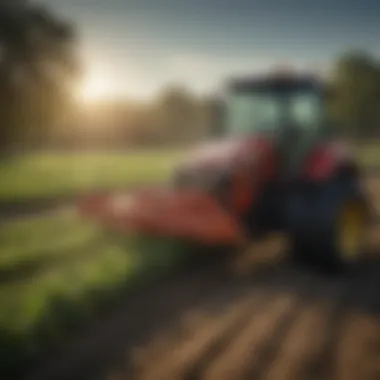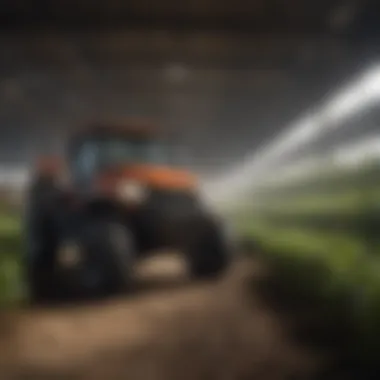Exploring Polaris in Dyersburg, TN: Insights and Innovations


Intro
The Polaris facility in Dyersburg, Tennessee, stands as a pivotal player in the intersection of agriculture and manufacturing. As the demands of modern farming evolve, Polaris has consistently adapted to meet these needs, fostering innovations that impact both the local economy and the broader agricultural landscape. The insights gathered from this exploration reveal the significance of the company's operational methods and its role in shaping sustainable practices. In an era where the agricultural sector faces pressing challenges, understanding how Polaris navigates these waters is crucial for farmers and enthusiasts alike.
Topic Overview
Definition and Importance
Polaris is renowned for its manufacturing of off-road vehicles and equipment that play a vital role in the agricultural sector. By providing advanced machinery, Polaris enhances farming efficiency and productivity. The importance of this facility extends beyond its economic contributions, as it embodies an innovative spirit that drives sustainable agricultural practices in the region.
Brief History and Evolution
The history of Polaris in Dyersburg traces back several decades. Initially focused on traditional manufacturing processes, the facility has evolved significantly. Recognizing the need for integration with modern agricultural techniques, Polaris has shifted towards producing equipment that supports sustainable farming. This evolution reflects broader trends within the industry, where innovation is essential to address the challenges of changing climates, labor shortages, and market demands.
Key Techniques and Innovations
Sustainable Farming Practices
Polaris has pioneered several sustainable farming practices. These initiatives aim to reduce environmental impact while enhancing crop yields. The following practices are prominent:
- Use of Durable Materials: Equipment is designed with longevity in mind, minimizing waste.
- Energy Efficiency: Innovations include fuel-efficient engines that reduce carbon footprints.
- Precision Farming Tools: Integration of technology that allows farmers to apply resources more judiciously.
Advanced Agronomic Technologies
The adoption of agronomic technologies has transformed how farmers operate. Polaris offers tools that include:
- GPS Assisted Technology: For improved land use and planting accuracy.
- Automated Machinery: Reducing manual labor while increasing efficiency.
- Data Analytics: Enabling farmers to make informed decisions based on real-time data.
Practical Applications
Step-by-Step Guides
Implementing Polaris equipment involves several steps that farmers can follow to maximize their investments. Some recommendations include:
- Assessment of Farm Needs: Determine which type of equipment aligns best with your farming methods.
- Training: Take advantage of training provided by Polaris to understand machinery capabilities.
- Maintenance: Regular inspections and timely repairs can extend the lifespan of your equipment.
Case Studies or Real-World Examples
Numerous case studies highlight the practical impact of Polaris equipment in farming. A notable example is the adoption of their precision planters by local farmers in Dyersburg. These planters have shown:
- An increase in crop yields by approximately 15%.
- Reduction in waste through optimized planting methods.
"The advances made by Polaris are not just about efficiency; they redefine what sustainable agriculture looks like today."
Through examining these innovations and applications, it becomes evident how the Polaris facility in Dyersburg is reshaping not just local farming but the broader agricultural conversation. The challenges are real, but so too are the opportunities for growth and sustainability.
Preamble to Polaris in Dyersburg, TN
Polaris Industries is of significant importance in Dyersburg, Tennessee, not only due to its economic contributions but also for its role in shaping the local agricultural landscape. This section will provide a comprehensive look at why the facility is key to the community and the broader implications of its operations.
The Dyersburg plant is part of a well-established company known for producing various vehicles and equipment, vital for both recreational use and agricultural applications. This dual focus allows Polaris to influence economic growth and innovation in agriculture, making it more than just a manufacturing hub; it is a catalyst for development.
In terms of job creation, the Polaris facility has provided numerous employment opportunities, stabilizing the local economy. Workers gain skill sets that are applicable in various industries, extending the benefits beyond the factory walls. Moreover, the facility's presence has encouraged local businesses to thrive, as the workforce contributes to the demand for various services and products in Dyersburg.
Another essential aspect is Polaris's commitment to sustainability and technological advancements. The plant implements modern manufacturing techniques aimed at reducing waste and improving efficiency. This approach does not only foster a competitive edge but also reflects a growing awareness of environmental issues within the agricultural sector.
To summarize, the Dyersburg Polaris facility stands as a pillar of economic and social growth, embodying the synergy between industry and agriculture. Understanding its role will reveal layers of interaction between production, employment, and community welfare that are crucial for stakeholders, including farmers and agricultural enthusiasts, seeking to engage with this evolving landscape.


Historical Background of Polaris Industries
Understanding the historical background of Polaris Industries is essential to grasp its contributions and growth in Dyersburg, Tennessee. The evolution of Polaris reflects not only a journey of innovation but also an affirmation of its role in local economies where it operates. Knowing how Polaris started and developed helps us appreciate its current impact, especially in sectors like agriculture, where its machines facilitate various farming operations.
Founding and Growth Timeline
Polaris Industries was founded in 1954 in Roseau, Minnesota, by a group of engineers with a vision for outdoor recreational vehicles. The initial product was a snowmobile, a revolutionary innovation at the time. Over the years, Polaris expanded its offerings, moving into all-terrain vehicles (ATVs) and side-by-sides. The company’s growth was fueled by a commitment to engineering excellence and responsive market strategies.
As the years passed, Polaris strategically diversified its product line and entered various new markets. By 1980, Polaris had established a reputation for quality and reliability, leading to increased demand for its vehicles. This growth was not purely financial; it also involved expanding the company’s footprint. New factories were opened in different locations, enhancing production capacity.
Polaris's Expansion into Dyersburg
The decision to expand into Dyersburg was a significant milestone in Polaris's history. In 2005, Polaris opened a manufacturing facility in Dyersburg, Tennessee. This move was motivated by the area's skilled workforce and its proximity to essential transportation networks. Dyersburg offered an attractive business environment with its supportive local government and strong community ties.
The Dyersburg facility quickly became a vital hub for Polaris. It specializes in producing parts and assembling vehicles, contributing significantly to the local economy. Furthermore, creating jobs and supporting local supply chains played a key role in the expansion.
This venture not only exemplifies Polaris's growth strategy but also highlights its commitment to community involvement. By establishing its presence in Dyersburg, Polaris positioned itself closer to agriculture-centric innovations, facilitating partnerships with local farmers. This alignment has led to powerful synergies between Polaris's manufacturing prowess and the agricultural landscape of the region, paving the way for future developments in both sectors.
Polaris's Manufacturing Operations
Polaris Industries has established a significant presence in Dyersburg, Tennessee, primarily through its manufacturing operations. These processes play a critical role in the company's ability to deliver high-quality products while also supporting the economic framework of the local community. Manufacturing operations at Polaris are not just about assembly; they encompass a plethora of sophisticated techniques and technologies that ensure efficiency and excellence. This section dives into the mechanics of production while highlighting the broader impacts on stakeholders and the environment.
Overview of Production Lines
Polaris's manufacturing facility in Dyersburg features several production lines tailored to different product categories. The setup allows for increased flexibility and responsiveness to market demands. Each production line is designed to optimize workflow, reduce waste, and enhance productivity. Key components include:
- Assembly areas that efficiently integrate various parts into finished products.
- Quality control stations that ensure each item meets Polaris’s high standards before distribution.
- Material handling systems that streamline the movement of components, minimizing downtime.
These production lines are crucial in facilitating a quick response to changing consumer preferences while also ensuring that operational costs remain in check. By utilizing modern assembly technologies, Polaris effectively combines human skills with automation, driving both speed and precision in the manufacturing process.
Key Products Manufactured in Dyersburg
The Dyersburg plant is responsible for a wide range of Polaris products that cater to diverse consumer needs. Some of the key products manufactured include:
- All-terrain vehicles (ATVs) that are renowned for their durability and performance, designed for both recreational and utility use.
- Snowmobiles, which showcase Polaris's commitment to innovation in winter sports and outdoor adventure sectors.
- Parts and accessories that enhance the functionality and customization of their vehicles, ensuring a tailored experience for users.
These products not only contribute to Polaris’s bottom line but also serve vital roles in various industries, particularly agriculture. Farmers rely on ATVs for mobility and task efficiency in everyday operations. Additionally, the production of these items in Dyersburg strengthens local employment, as skilled workers are needed to maintain the quality and safety standards set by the company. Overall, the manufacturing operations are interlinked with the community's economic fabric, producing goods that satisfy both local and national market demands.
Economic Impact on the Dyersburg Community
The economic impact of Polaris in Dyersburg, Tennessee, cannot be overstated. This facility acts as a significant pillar within the local economy. Its influence extends beyond merely producing and distributing vehicles; it shapes job opportunities, community development, and the fostering of local businesses. Understanding these aspects reveals how Polaris integrates itself into the fabric of Dyersburg and contributes to its prosperity.
Job Creation and Employment Opportunities
One of the most notable contributions of Polaris is its capacity to create jobs. The Polaris facility in Dyersburg employs hundreds of individuals, providing them with stable income sources. This job creation is crucial not just for Polaris as a company, but for the broader community.
The positions offered by the plant span various expertise levels, from manufacturing roles to management duties. This diversity helps to cater to a wide array of skill sets within the local workforce. Moreover, the jobs often include competitive wages and benefits, attracting talent from surrounding areas as well.
Additionally, Polaris's presence stimulates indirect employment opportunities. Local suppliers and service providers benefit from the demand generated by the facility. Effectively, for every job created at Polaris, there tends to be a multiplier effect that promotes further employment in the community.
Contributions to Local Businesses
Polaris's operations significantly impact local businesses in various ways. The demand for raw materials, services, and products leads to stronger relationships with local suppliers. Many businesses in Dyersburg find opportunities to supply Polaris with components needed for manufacturing, thereby ensuring a steady flow of revenue.
Furthermore, Polaris's workforce positively affects local retail and service industries. As employees earn wages, they contribute to various businesses, including restaurants, grocery stores, and other amenities. A vibrant local economy flourishes as spending increases, leading to greater opportunities for businesses to grow and innovate.
In summary, the economic impact of Polaris on Dyersburg is far-reaching. It creates jobs, supports local businesses, and enhances the area’s overall economic stability. The investment in community development fosters a sustainable environment where both Polaris and Dyersburg can thrive together.
Sustainability Practices at Polaris


Polaris understands that sustainability is not just a buzzword but a critical component of modern manufacturing. The company is integrating eco-friendly practices within its operations in Dyersburg. This commitment not only helps the environment but also enhances operational efficiency. It addresses community concerns while meeting regulatory demands. Key elements of these practices include adhering to environmental standards and innovating waste management strategies.
Commitment to Environmental Standards
Polaris prioritizes environmental standards as a pillar of its operational ethos. This commitment manifests in various forms, including reducing greenhouse gas emissions, conserving water, and implementing energy-efficient technologies in the production line.
The establishment of benchmarks for environmental performance allows Polaris to monitor its impact over time. Regular audits ensure compliance with local and national regulations. By aligning with organizations that focus on sustainable practices, the company demonstrates accountability.
Additionally, employee training programs reinforce the importance of sustainability. Workers- at all levels can contribute ideas for waste reduction and resource optimization. This participatory approach fosters a culture focused on long-term environmental health.
"Operating sustainably is not only good for the planet; it also enhances our brand reputation and builds customer loyalty."
Innovative Waste Management Strategies
Polaris implements cutting-edge waste management strategies to minimize its footprint. One significant approach involves the recycling of materials used in manufacturing. The facility has established partnerships with local recycling firms to ensure proper disposal and repurposing of waste materials. This not only aids in diverting waste from landfills but also supports the local economy by engaging regional businesses.
The use of modular manufacturing techniques further enhances waste efficiency. By optimizing production processes, Polaris reduces the scrap generated during manufacturing. This strategy leads to sizeable cost savings and promotes responsible resource use.
In the pursuit of sustainability, Polaris has also adopted an adaptive approach to waste management. Keeping a close eye on emerging technologies in waste reduction allows continuous improvement in strategies designed for minimizing waste.
Overall, the sustainability practices at Polaris serve as a prominent example of how corporations can integrate eco-friendly methods into their business models. The company's commitment to environmental standards and innovative waste management strategies showcases a roadmap other industries can follow.
Technological Innovations in Manufacturing
Technological innovations have reshaped the manufacturing landscape at Polaris in Dyersburg, TN. The implementation of new technologies not only boosts productivity but also enhances product quality and operational efficiency. Understanding these innovations is crucial for anyone wanting insight into manufacturing trends, especially in the agricultural sector.
Automation in Production Processes
The use of automation in Polaris's production processes represents a significant leap forward in manufacturing capability. Automation reduces the margin for human error, leading to more consistent product quality. By utilizing robotics and automated systems, Polaris can increase its production rates while maintaining precision. This is particularly beneficial in high-demand seasons for agricultural equipment. The robots can perform repetitive tasks, which frees up human workers to focus on more complex duties. This flexibility enables quicker responses to changes in order volumes and supply chain dynamics.
Moreover, automation contributes to lower operational costs. With machinery handling a significant portion of the work, there is less reliance on manual labor. This shift aligns with Polaris's strategy to optimize resource allocation. Eventually, this improved efficiency allows Polaris to remain competitive in the crowded market of agricultural equipment.
Use of Advanced Materials
In addition to automation, the adoption of advanced materials has become a focal point of innovation at Polaris. Materials like high-strength steel and lightweight composites improve the durability and performance of products while reducing the overall weight. This is particularly important for vehicles and equipment used in agriculture where equipment longevity and effectiveness are paramount.
Advanced materials also help in energy efficiency, which is vital in sustainable manufacturing practices. Lightweight components require less energy to move, contributing to lower fuel consumption during operation. This benefits the end-users, such as farmers, by lowering the total cost of ownership.
When Polaris uses innovative materials, it sets a precedent in the industry, encouraging peers to follow suit. This shift contributes to a culture of continuous improvement within the agricultural sector. The combination of automated processes and advanced materials solidifies Polaris's commitment to leading the way in technological advancements in manufacturing.
Collaboration with Local Agricultural Sectors
The collaboration between Polaris and the local agricultural sectors plays a vital role in reinforcing the link between manufacturing and farming. This partnership enriches both fields, paving the way for innovations that enhance productivity and sustainability. Companies like Polaris, which focus on manufacturing, have unique insights into the agricultural needs in their vicinity. This understanding can lead to the development of tailored solutions that cater specifically to local farmers and growers, thus addressing their challenges.
Partnerships with Farmers and Growers
Polaris has strategically established partnerships with farmers and growers in Dyersburg and surrounding areas. These partnerships are not merely transactional; they focus on mutual growth and improvement. By working closely with local agricultural stakeholders, Polaris gains valuable insights into farming practices and requirements. This can help them to optimize their products. For instance, adjustments in manufacturing processes can be made to better suit the tools utilized by farmers, such as ATVs and utility vehicles.
Additionally, these partnerships offer farmers access to Polaris's latest innovations. Farmers can provide feedback on new products, ensuring that they meet real-world demands. Such collaborative efforts can lead to enhanced equipment that can increase farm efficiency, thus benefitting both Polaris and the agricultural community at large.
Support for Agricultural Innovations
Beyond partnerships, Polaris is committed to supporting agricultural innovations. This support takes many forms. One approach includes providing funding for research projects focused on new farming techniques and equipment. Polaris may also partner with research institutions to explore smarter solutions that can contribute to sustainable farming.
Moreover, their involvement in agricultural technology extends to hosting workshops and training sessions for local farmers. These initiatives help disseminate knowledge about the latest advancements in agriculture, encouraging farmers to adopt new methods that improve crop yields and farm management.
Challenges Faced by Polaris in Dyersburg
Understanding the challenges faced by Polaris in Dyersburg is essential. It addresses the complexities of operating in a competitive economic environment. Moreover, these challenges bring awareness to how external factors can influence local production and employment. To ensure sustained growth, Polaris must navigate these hurdles effectively. The discussion below provides clarity on some critical challenges.


Market Competition and Economic Factors
The outdoor vehicle manufacturing sector is highly competitive. Polaris faces pressure from other manufacturers like Arctic Cat and Honda. This competition shapes pricing, marketing strategies, and innovation. Additionally, economic factors such as fluctuating raw material costs and changing consumer demands further complicate Polaris's operations in Dyersburg.
- Price Sensitivity: As competition increases, customers become more price-sensitive. This can reduce profit margins for Polaris.
- Economic Fluctuations: A recession or economic downturn can limit consumer spending on recreational vehicles. Polaris must prepare to adjust its strategies according to these economic conditions.
Some of these challenges are unavoidable but can be managed with strategic planning. The approach Polaris takes toward market competition can significantly impact their long-term success.
Operational Challenges in Manufacturing
Operational challenges can hinder production efficiency at Polaris's Dyersburg facility. Maintaining a smooth manufacturing process is vital for meeting consumer demand and upholding product quality.
- Supply Chain Issues: Disruptions in the supply chain can cause delays in production. This can happen due to natural disasters or geopolitical tensions affecting the availability of key materials.
- Labor Shortages: Finding skilled labor is a continuing challenge across various industries. Polaris must invest in training programs to ensure a capable workforce.
- Technology Integration: While adopting advanced manufacturing technologies can enhance efficiency, it also presents challenges. Implementing new systems requires significant time and resources. Staff must adapt quickly to ensure production remains efficient.
"Navigating operational challenges is crucial to ensure that Polaris can meet both current and future demands in the competitive landscape."
Polaris faces complicated operational and market pressures that require targeted strategies. Understanding these challenges enables them to identify opportunities for growth and innovation. Addressing these issues will be pivotal to Polaris's continued success in Dyersburg.
Future Prospects for Polaris
The future of Polaris in Dyersburg is a topic of considerable interest. As the agricultural sector grapples with various challenges, Polaris holds a vital position. Analyzing the future prospects of this facility reveals its potential for expansion, growth, and involvement in innovative agricultural technologies. Understanding these elements is essential for grasping the possible trajectory of Polaris within the local and broader agricultural landscape.
Plans for Expansion and Growth
Polaris has articulated several plans aimed at expanding its operations in Dyersburg. This is driven by increasing demand for its products, particularly as agriculture evolves and requires more advanced equipment. The expansion might include increasing workforce numbers and scaling production capabilities.
Key aspects of this expansion include:
- Increased Capacity: To meet demand efficiently, Polaris aims to enhance its manufacturing capacity.
- Technology Investments: There is an emphasis on investing in more advanced production technologies, which will streamline operations and improve product quality.
- Strengthening Local Partnerships: Polaris plans to bolster collaboration with local suppliers to support its production lines.
Polaris’s commitment could lead not only to job creation but also to the strengthening of the local supply chain. This can result in a more robust local economy, which is critical for Dyersburg's long-term growth.
Involvement in Emerging Agricultural Technologies
Addressing the technological advancements within the agricultural sector is another significant aspect for Polaris. The company’s involvement with emerging technologies could revolutionize the farming practices in the region. It plans to focus on integrating cutting-edge innovations such as precision agriculture tools and automated machinery.
Important points regarding this involvement include:
- Research and Development: Investing in R&D to foster innovative agricultural solutions that can benefit local farmers.
- Training and Support: Offering training programs to ensure that farmers effectively use new technologies, thereby maximizing outputs.
- Sustainability Goals: Aligning its technology initiatives with sustainability efforts to support environmentally responsible farming practices.
These initiatives could position Polaris not only as a leader in manufacturing but also as a key player in advancing agricultural efficiency and sustainability in Dyersburg. Through these measures, Polaris can set a precedent for innovation in the agricultural industry, making it an integral part of the community's economic future.
Culmination
The conclusion of this article emphasizes the pivotal role Polaris plays in Dyersburg, Tennessee. Understanding this topic is key for both local stakeholders and those outside the region. The impact of Polaris extends beyond mere manufacturing; it ripples through various sectors, especially agriculture.
In assessing the economic contributions, it's clear that job creation is substantial. The facility brings numerous opportunities for employment within the community. Many local families rely on the jobs provided by Polaris, and this economic boost helps sustain many businesses in Dyersburg.
Additionally, the collaboration between Polaris and local agricultural sectors indicates a forward-thinking approach. Such partnerships not only foster innovation but also improve agricultural productivity. This often leads to enhanced food security and environmental sustainability.
Finally, the challenges faced by the company, from market competition to operational hurdles, can serve as valuable lessons. Understanding how Polaris navigates these challenges may offer insights into enhancing resilience.
In summary, the synthesis of these elements showcases Polaris's essential part in shaping Dyersburg's economy and community. Understanding these dynamics can aid interested parties, especially farmers and agricultural enthusiasts, in recognizing how Polaris's innovations can benefit them.
Summary of Key Points
- Job Creation: Polaris significantly enhances local employment.
- Economic Contributions: The facility supports local businesses, contributing to a vibrant economy.
- Agricultural Partnerships: Collaboration with local farmers leads to shared innovations and improved practices.
- Environmental Sustainability: Initiatives at Polaris aim to address ecological concerns, reflecting a commitment to responsible practices.
- Challenges: Market pressures and operational issues provide important lessons for the future.
Final Thoughts on Polaris in Dyersburg
Polaris represents much more than just a manufacturing plant. It stands as a symbol of growth and opportunity within the Dyersburg community. The synergy between Polaris and local agricultural sectors highlights a forward-looking approach, aligning economic growth with sustainability. Farmers and enthusiasts should pay attention to the trends driven by Polaris. These developments can influence agricultural practices, providing tools and technologies that lead to enhanced production.
"Innovation in agriculture often comes from unexpected partnerships, and Polaris exemplifies this with its local collaborations."
Dyersburg stands as a testament to what is achievable when industry and community align their goals.



